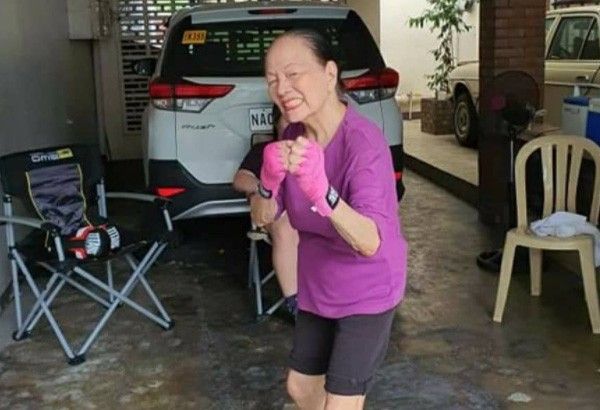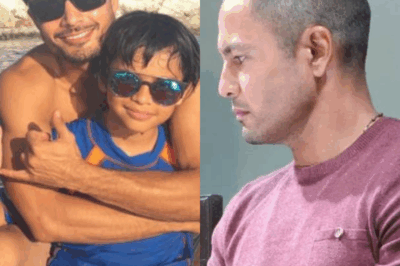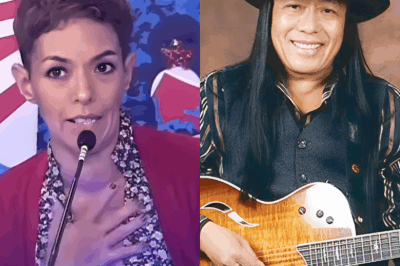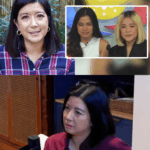“A Long Goodbye”: Caridad Sanchez’s Daughter Shares Emotional Journey Through Mother’s Dementia

In a deeply moving revelation, Cathy Babao, grief counselor and daughter of beloved Filipina actress Caridad Sanchez, opened her heart to the public with a story that resonated far beyond the world of showbiz. Sharing the reality of her mother’s battle with dementia, Babao didn’t just narrate a personal loss—she offered a universal message of courage, awareness, and love in the face of a long and painful farewell.
Sanchez, now 87 years old, has been a familiar face in Philippine entertainment for decades. Known for her maternal roles in teleseryes and films, she represents a generation of performers who defined classic Filipino television and cinema. Yet behind the warmth and strength she portrayed onscreen, Sanchez has quietly faced one of life’s most heartbreaking conditions—one that slowly erases memory, identity, and connection.
A Quiet Diagnosis, A Growing Realization
According to Babao, her mother was first diagnosed with dementia in late 2015. At the time, it was a private battle, shared only among close family members. “She remains physically strong,” Babao noted in an interview. “But there are good days and bad days. What’s hardest is the repetition—the same questions, the same stories, over and over again.”
As the years passed, the emotional weight became heavier, not just due to the nature of the illness, but because of the silence surrounding it. Eventually, Cathy felt compelled to speak out.
“It’s not something to be ashamed of,” she explained. “There are so many families going through this. Why hide it when we could be helping each other navigate it?”
“Anticipatory Grief”: Loving Someone Who’s Slowly Fading
Babao, who has helped countless individuals process loss through her grief counseling work, described what she’s going through as “anticipatory grief”—the pain of losing someone little by little, even while they’re still alive.
“It’s a long goodbye,” she shared. “Every day you lose small pieces of the person you love. And every day, you try to hold on to what remains.”
The phrase “long goodbye” encapsulates not just the slow progression of dementia, but also the emotional journey Babao and her family have undertaken. It’s a path filled with bittersweet moments—fleeting recognition, quiet afternoons, laughter followed by confusion.
She recalls reading the book Still Alice by Lisa Genova shortly after her mother’s diagnosis—a novel that follows a woman grappling with early-onset Alzheimer’s. “I cried reading the last pages,” Babao said. “There’s a line that stayed with me: ‘Even if you don’t remember me, I’ll tell you I love you—and you’ll believe me.’ That is the power of love. That is what keeps us going.”
Honoring the Silence by Breaking It
As a grief educator, Babao knew the power of naming pain. But doing so publicly, especially when it involves a family icon, took time. “It’s difficult,” she admitted. “Because of who my mom is. But ultimately, I knew this was the right thing to do—not just for her, but for others who feel alone in this.”
Her decision to speak out came with a flood of reactions. “Overwhelming,” she described. “There was heartbreak, but also gratitude. Many thanked me for shedding light on something so many of us are silently living through.”
Part of Babao’s advocacy now includes encouraging early detection and creating more open conversations around dementia. “The earlier we accept what’s happening, the more we can do. There’s medicine, there’s therapy, there’s support. But first, we need to take away the shame.”
She also emphasizes that while the disease is devastating, it doesn’t erase everything. “My mom might forget names, faces, even her own stories. But she still feels love. The heart remembers what the mind can no longer hold.”
Turning Grief Into Mission

What makes Babao’s voice even more compelling is her own history of loss. In 1998, she lost her 4-year-old son, Migi, to heart disease. It was a moment that changed the course of her life, steering her toward grief education and emotional healing.
Now, she sees this journey with her mother as another chapter in that mission—a chance to walk through grief not just as a counselor, but as a daughter. “I never got to say goodbye to my dad when he died suddenly at 49. This time, maybe I’ve been given the chance to say all the things I need to say. To show love in every possible way while I still can.”
Her writing and social media posts, especially under the hashtags #CaringChronicles and #TheLongGoodbye, have become sources of reflection and strength for others going through similar experiences. She’s also continued her grief counseling work through webinars and her YouTube series, Conversations with Cathy, aiming to build a community that faces emotional pain with honesty and compassion.
A Legacy Beyond the Screen

For fans of Caridad Sanchez, the revelation is undoubtedly a jarring contrast to the roles she once played—strong, sharp-witted matriarchs whose presence filled the screen. Yet Babao believes her mother’s legacy is not diminished by the disease, but expanded by the love that surrounds her.
“She may not remember the characters she played, or the scenes she delivered so flawlessly,” Babao reflects. “But what I want people to know is that she lived a life full of meaning, and she is still deeply loved.”
As she continues to care for her mother through the ups and downs of dementia, Babao clings to the little moments: a smile, a shared song, a flash of recognition. “That’s what I hold on to. Because in the end, it’s not about what she remembers—but how she feels. And I want her to feel loved until the very end.”
A Call for Awareness, Compassion, and Connection
With October recognized as National Mental Health Month in the Philippines, Babao’s story is more than personal—it’s a timely reminder that mental and neurological health must be treated with the same compassion and attention as any other illness.
“I hope people stop whispering about dementia,” she says. “Let’s bring it out into the open, learn about it, talk about it, and support one another.”
In a culture that often values strength in silence, Babao’s courage to speak up redefines what strength really looks like: vulnerable, open-hearted, and grounded in love.
As she walks this long goodbye with her mother, she leaves us with a truth that’s simple, but powerful:
“The mind may forget. But the heart always remembers.”
News
Ellen Adarna and Derek Ramsay Rumored to Have Split—Cristy Fermin Sets the Record Straight
Recently, social media and several online forums have been abuzz with speculation regarding the alleged separation of celebrity couple Ellen…
😱 “Shocking Family FEUD? Ruffa Gutierrez BLASTS Barbie Connection in Explosive Sibling Clash
Ruffa Gutierrez Isiniwalat Naguguluhan Sa Relasyon Nina Richard Gutierrez at Barbie Imperial Biyernes, Hunyo 13, 2025 Agad na naging usap-usapan…
“What Really Happened to Freddie Aguilar’s Inherited Home? Megan’s Quiet Move Sparks Fan Outrage, Hidden Deal Now Exposed!”
MEGAN ADMITS THE TRUTH: “I Was the Reason Freddie Disappeared” — A Nation Demands Answers MANILA, Philippines — In a…
No one saw it coming: Red Sternberg is preparing to step back into the spotlight after years of silence, with a major deal that could completely turn his career around – Michael Flores speaks out for the first time! ‘I’m not coming back to play – I’m coming back to win!’ Red Sternberg declares with confidence.”
Michael Flores reveals Red Sternberg’s plan for showbiz comeback Michael Flores heartbroken over Red Sternberg’s death. Michael Flores (right) on…
Did She Just Meet the In-Laws? Bea Alonzo Spotted Getting Cozy with Vincent Co’s Famil
Bea Alonzo spotted with mom of rumored beau Vincent Co Bea attended an event with Vincent and his family. Ikinatuwa…
My Name Wasn’t in the Will… But What He Left Me Was Priceless” — Maegan Aguilar Uncovers Freddie’s Final Gift 💔✨ “He didn’t leave me money. He left me the truth… and that changed everything.”
“My Name Wasn’t in the Will… But What He Left Me Was Priceless” — Maegan Aguilar Explores Freddie’s Final Gift…
End of content
No more pages to load












